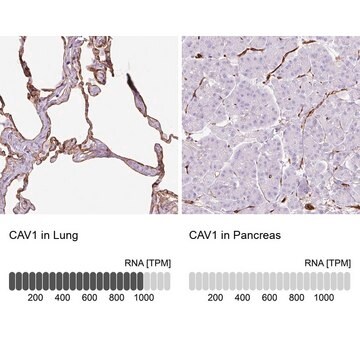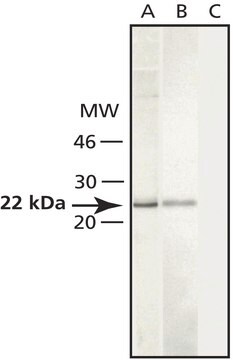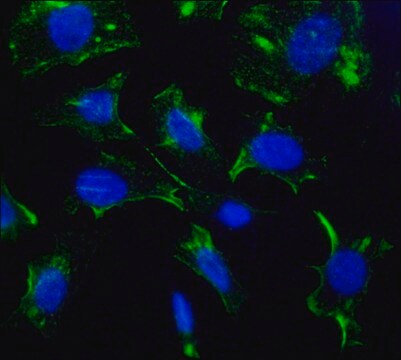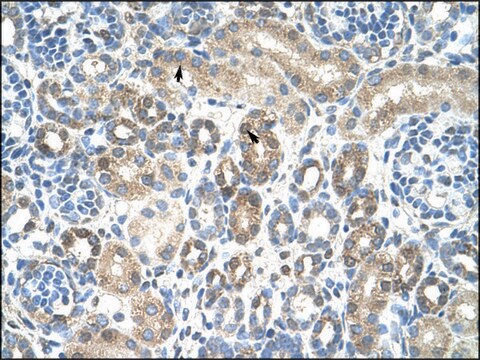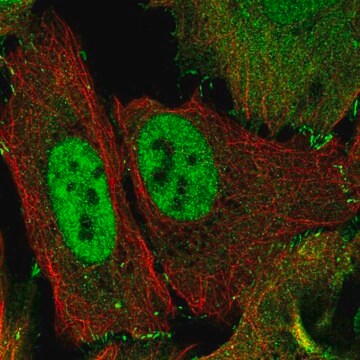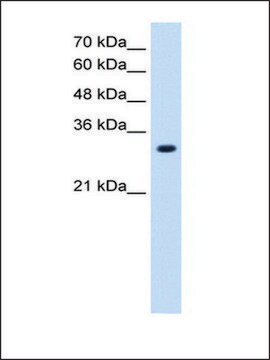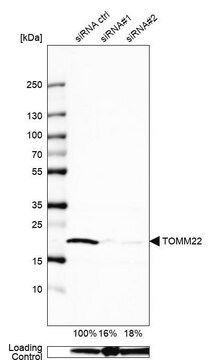C3237
Anti-Caveolin-1 antibody produced in rabbit

IgG fraction of antiserum, buffered aqueous solution
Synonyme(s) :
Anti-Caveolin-1, Anti-VIP21
About This Item
Produits recommandés
Source biologique
rabbit
Conjugué
unconjugated
Forme d'anticorps
IgG fraction of antiserum
Type de produit anticorps
primary antibodies
Clone
polyclonal
Forme
buffered aqueous solution
Poids mol.
antigen 22 kDa
Espèces réactives
human, rat, mouse
Validation améliorée
independent
Learn more about Antibody Enhanced Validation
Technique(s)
indirect immunofluorescence: 1:500 using mouse fibroblast NIH3T3 cell line
microarray: suitable
western blot: 1:2,000 using whole cell extract of the human umbilical vein endothelial HUVEC cell line and the rat fibroblast Rat-1 cell line
Numéro d'accès UniProt
Conditions d'expédition
dry ice
Température de stockage
−20°C
Modification post-traductionnelle de la cible
unmodified
Informations sur le gène
human ... CAV1(857)
mouse ... Cav1(12389)
rat ... Cav1(25404)
Vous recherchez des produits similaires ? Visite Guide de comparaison des produits
Description générale
Spécificité
Immunogène
Application
- indirect immunofluorescence
- in confocal microscopy
- western blotting
Actions biochimiques/physiologiques
Forme physique
Clause de non-responsabilité
Vous ne trouvez pas le bon produit ?
Essayez notre Outil de sélection de produits.
Produit(s) apparenté(s)
Code de la classe de stockage
10 - Combustible liquids
Classe de danger pour l'eau (WGK)
WGK 1
Point d'éclair (°F)
Not applicable
Point d'éclair (°C)
Not applicable
Certificats d'analyse (COA)
Recherchez un Certificats d'analyse (COA) en saisissant le numéro de lot du produit. Les numéros de lot figurent sur l'étiquette du produit après les mots "Lot" ou "Batch".
Déjà en possession de ce produit ?
Retrouvez la documentation relative aux produits que vous avez récemment achetés dans la Bibliothèque de documents.
Notre équipe de scientifiques dispose d'une expérience dans tous les secteurs de la recherche, notamment en sciences de la vie, science des matériaux, synthèse chimique, chromatographie, analyse et dans de nombreux autres domaines..
Contacter notre Service technique